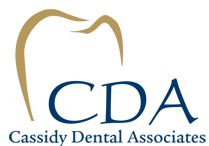FAQ's
How often should I have a dental exam?
Regular dental exams and cleaning visits are essential in preventing dental problems and maintaining the health of your teeth and gums. At these visits, your teeth are cleaned and checked for cavities. You should have your teeth checked and cleaned at least twice a year, though Dr. Cassidy’s team may recommend a plan more suited to your particular needs.
How can cosmetic dentistry help improve the appearance of my smile?
Due to the many advances in cosmetic dental procedures and materials available today, cosmetic dentistry has become very popular over the last several years. Depending on your particular needs, cosmetic dental treatment can change your smile dramatically, from restoring a single tooth to having a full mouth make-over, leaving you feeling more confident with a healthy smile.
What types of cosmetic procedures are available?
Teeth Whitening, Bleaching, Composite Fillings, Porcelain Veneers, Porcelain Crowns and Dental Implants are just a few of the procedures available. Contact Dr. Cassidy’s team for a personalized plan on how we can improve the health and beauty of your smile.
What are porcelain veneers?
Porcelain veneers are very thin shells of tooth-shaped porcelain that are individually crafted to cover the fronts of teeth. They are durable and will not stain, making them a very popular choice for those seeking to restore the beauty of their smile.
What are dental implants?
A dental implant is a titanium metal replacement for the root of a tooth that is surgically implanted in the jawbone. As the body heals, the bone around the implant fuses to the implant. After the healing phase is complete, the implants are used to anchor crowns, bridges, or dentures.
What are some of the symptoms of TMJ syndrome?
Symptoms of TMJ dysfunction can include: jaw pain or soreness, soreness in front of the ear, clicking or grinding noise while opening/closing your mouth, stiff jaw when eating, talking, or yawning. Dr. Cassidy can help alleviate the discomfort associated with TMJ syndrome. Please be sure to discuss any symptoms with him at your next appointment.
